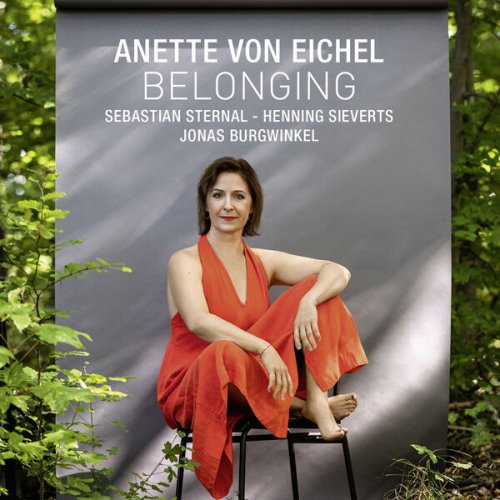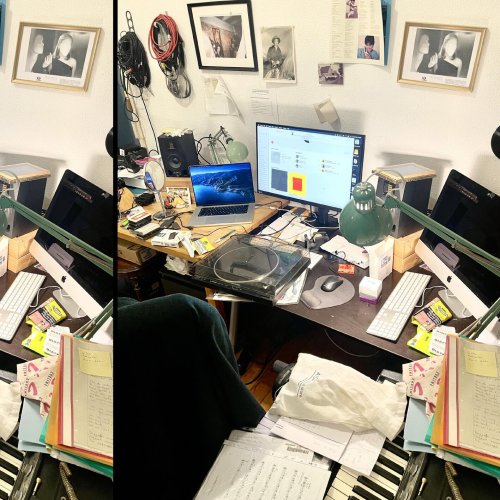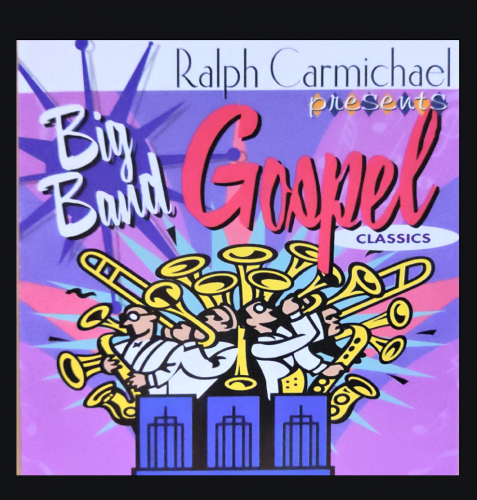Anette von Eichel - Belonging (2023)

Artist: Anette von Eichel, Sebastian Sternal, Jonas Burgwinkel, Henning Sieverts
Title: Belonging
Year Of Release: 2023
Label: Double Moon Records
Genre: Jazz, Vocal Jazz
Quality: FLAC (tracks)
Total Time: 52:43
Total Size: 301 MB
WebSite: Album Preview
Tracklist:Title: Belonging
Year Of Release: 2023
Label: Double Moon Records
Genre: Jazz, Vocal Jazz
Quality: FLAC (tracks)
Total Time: 52:43
Total Size: 301 MB
WebSite: Album Preview
01. Let's Go Slow
02. Burning Bridges
03. Ocean Boat Harbor
04. The Bridge
05. A Time for Love
06. Rocket Man
07. Tree of Life
08. Home
09. After the Storm
The English term “belonging” naturally raises the question of family origin, of parents, grandparents and siblings on the one hand. But on the other hand, there is also an “affiliation” in which life partners, friends, own children, co-workers, neighbors, acquaintances, etc. can play just as much a role as the social or political environment in the broader sense. This kind of belonging can perhaps best be described as “identity”. In the social sciences, however, this is no longer understood as something fixed and unchanging, but rather as a continuous process of self-discovery, which becomes a production site for inner and outer categories and criteria, with which one's own self can be formed and assembled again and again.
The Cologne singer Anette von Eichel also thought of this when she chose “Belonging” as the title for the second record with her quartet. The nine songs often deal with topics such as belonging, origin, identity, departure, arrival, etc. The lyrics of the Elton John classic "Rocket Man" (one of two pieces on this record that was not composed and written by Eichel ; the other is the jazz standard "A Time For Love") is an example of this. An astronaut is sent into space to find a new home for humanity. He is celebrated as a hero on Earth, but he has doubts during the long journey about the correctness of his actions. In general, he would much rather be at home on Earth; especially when he reaches his destination, Mars, and realizes that this inhospitable planet is not an attractive and livable place for humanity.
The quartet with von Eichel. Sebastian Sternal (piano), Henning Sieverts (bass) and Jonas Burgwinkel (drums),has been around for more than two years when the singer recruited them for the production of “Inner Tide”. They have been on tour and have rehearsed new pieces together since then. As a result, they have grown increasingly closer and have a feeling belonging to each other; in the process, they have found a new meaning for “belonging”. Of course, this had an effect on the atmosphere in the studio, where they were relaxed, friendly and laid-back with each other. At the same time, the recording of the songs was completely focused on the setting of the music. This contributed to the fact that the songs could also expand stylistically and aesthetically in the direction of rock, singer/songwriter or pop styles – of course with jazz as the basis, which combines tradition and modernity.
When von Eichel composes her own songs, she first writes the lyrics. On the one hand, she does this because the text leads them easily into the music. On the other hand, this kind of creative work makes it possible for her to leave her comfort zone and compose a piece of music without clichés and conventions. Only in this way does Eichel get the greatest possible freedom to let a song as a whole grow out of the respective lyrics. “Through the lyrics, for example, I have the opportunity to imagine at an early stage what color the harmonics will be, and what rhythms and what form could result from this,” von Eichel explained this process. “I believe that music has its own will, and if it doesn't like an idea, it resists it. For example, 'Tree Of Life‘ was previously available in many different versions until it then took the form that can now be heard on the new record.”
It is a testimony of great self-awareness that von Eichel starts “Belonging” with a ballad, “Let’s Go Slow”, which becomes the feature number for her and her quartet – with a rhythm group that sketches the harmonic and rhythmic space with a few tones and accents, with on-cue pauses that break up the metric flow again and again and put the harmonic foundation under tension per se, with a Sebastian Sternal who plays a quiet, a thoughtful and withdrawn piano solo, and with an Anette von Eichel who knows how to put this ballad into a loose frame with her equally emotional and eloquent phrasing art.
It perhaps testifies to even greater self-confidence that the singer ends her album with a piece that is actually quite atypical for her. Because von Eichel no longer only sings, but also speaks in “After The Storm”, this piece becomes an exegesis, which rebalances the text through the constant alternating of singing and speaking and tries to interpret it differently. By the way, the text is a variation on the subject of Doctor Faustus.
The Cologne singer Anette von Eichel also thought of this when she chose “Belonging” as the title for the second record with her quartet. The nine songs often deal with topics such as belonging, origin, identity, departure, arrival, etc. The lyrics of the Elton John classic "Rocket Man" (one of two pieces on this record that was not composed and written by Eichel ; the other is the jazz standard "A Time For Love") is an example of this. An astronaut is sent into space to find a new home for humanity. He is celebrated as a hero on Earth, but he has doubts during the long journey about the correctness of his actions. In general, he would much rather be at home on Earth; especially when he reaches his destination, Mars, and realizes that this inhospitable planet is not an attractive and livable place for humanity.
The quartet with von Eichel. Sebastian Sternal (piano), Henning Sieverts (bass) and Jonas Burgwinkel (drums),has been around for more than two years when the singer recruited them for the production of “Inner Tide”. They have been on tour and have rehearsed new pieces together since then. As a result, they have grown increasingly closer and have a feeling belonging to each other; in the process, they have found a new meaning for “belonging”. Of course, this had an effect on the atmosphere in the studio, where they were relaxed, friendly and laid-back with each other. At the same time, the recording of the songs was completely focused on the setting of the music. This contributed to the fact that the songs could also expand stylistically and aesthetically in the direction of rock, singer/songwriter or pop styles – of course with jazz as the basis, which combines tradition and modernity.
When von Eichel composes her own songs, she first writes the lyrics. On the one hand, she does this because the text leads them easily into the music. On the other hand, this kind of creative work makes it possible for her to leave her comfort zone and compose a piece of music without clichés and conventions. Only in this way does Eichel get the greatest possible freedom to let a song as a whole grow out of the respective lyrics. “Through the lyrics, for example, I have the opportunity to imagine at an early stage what color the harmonics will be, and what rhythms and what form could result from this,” von Eichel explained this process. “I believe that music has its own will, and if it doesn't like an idea, it resists it. For example, 'Tree Of Life‘ was previously available in many different versions until it then took the form that can now be heard on the new record.”
It is a testimony of great self-awareness that von Eichel starts “Belonging” with a ballad, “Let’s Go Slow”, which becomes the feature number for her and her quartet – with a rhythm group that sketches the harmonic and rhythmic space with a few tones and accents, with on-cue pauses that break up the metric flow again and again and put the harmonic foundation under tension per se, with a Sebastian Sternal who plays a quiet, a thoughtful and withdrawn piano solo, and with an Anette von Eichel who knows how to put this ballad into a loose frame with her equally emotional and eloquent phrasing art.
It perhaps testifies to even greater self-confidence that the singer ends her album with a piece that is actually quite atypical for her. Because von Eichel no longer only sings, but also speaks in “After The Storm”, this piece becomes an exegesis, which rebalances the text through the constant alternating of singing and speaking and tries to interpret it differently. By the way, the text is a variation on the subject of Doctor Faustus.


![Double Drums, Philipp Jungk & Alexander Glöggler - All You Can Beat (2026) [Hi-Res] Double Drums, Philipp Jungk & Alexander Glöggler - All You Can Beat (2026) [Hi-Res]](https://www.dibpic.com/uploads/posts/2026-02/1771946421_folder.jpg)

![Bill Champlin - Through It All (1994) [Japanese Edition] Bill Champlin - Through It All (1994) [Japanese Edition]](https://www.dibpic.com/uploads/posts/2026-02/1771699229_ff.jpg)

![Marius Neset - Time to Live (2026) [Hi-Res] Marius Neset - Time to Live (2026) [Hi-Res]](https://www.dibpic.com/uploads/posts/2026-02/1771945711_folder.jpg)

![Bob James, David Sanborn, Tsuyoshi Yamamoto, Susan Wong, Fourplay - The Best Of Evosound Audiophile (2024) [SACD] Bob James, David Sanborn, Tsuyoshi Yamamoto, Susan Wong, Fourplay - The Best Of Evosound Audiophile (2024) [SACD]](https://www.dibpic.com/uploads/posts/2026-02/1771744987_folder.jpg)